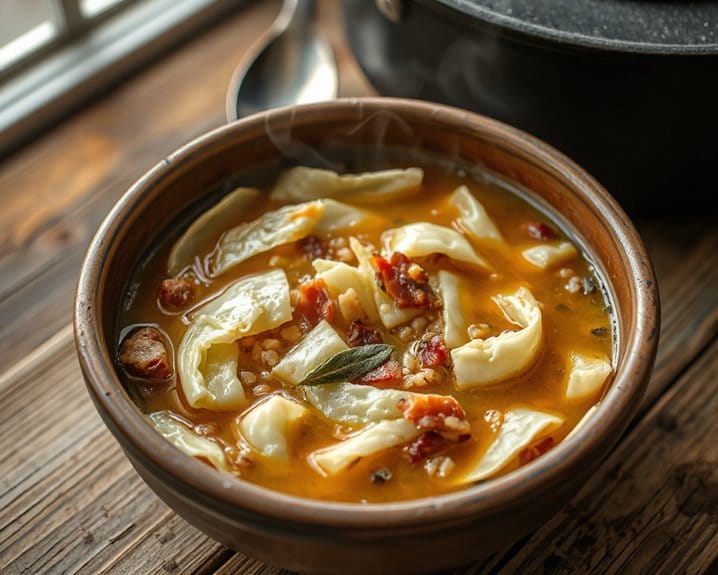Why You’ll Love this Hearty German Cabbage Soup
While many soups claim to be hearty, this traditional German cabbage soup truly lives up to the name. I’m talking about a rich combination of bacon, cabbage, and brown rice that creates a satisfying meal in a bowl. The bacon adds a smoky depth, while the long-simmered cabbage becomes tender and sweet—nothing like the pungent stuff that might haunt your childhood memories.
The sprinkle of Emmenthaler cheese melting on top adds a nutty finish that ties everything together. Plus, it’s economical and nutritious. On those chilly evenings when you need something warming but don’t want to fuss, this rustic German classic delivers comfort with minimal effort.
What makes this Kabissuppe special? It’s the perfect balance of simple ingredients transformed through careful cooking.
What Ingredients are in Hearty German Cabbage Soup?
This traditional German cabbage soup, known as Kabissuppe, brings together simple ingredients to create a hearty, comforting meal that’s perfect for chilly days. The combination of cabbage, bacon, and rice creates a satisfying texture, while the Emmenthaler cheese adds a rich, nutty finish that elevates this humble dish to something special. You’ll need just a handful of everyday ingredients to bring this classic soup to your table.
- 2 slices bacon, chopped
- 2 tablespoons minced yellow onions
- 4 cups thinly sliced white cabbage
- 1/2 teaspoon dried sage
- 1/4 teaspoon pepper
- 1/4 teaspoon salt
- 1 tablespoon white flour
- 6 cups water
- 1 chicken bouillon cube
- 1/2 cup long grain brown rice
- 4 tablespoons grated Emmenthaler cheese
When shopping for these ingredients, quality matters in a simple soup like this. Look for fresh, crisp cabbage with tightly packed leaves, and if you can’t find Emmenthaler cheese, Swiss cheese makes a fine substitute. The bacon provides a savory base for the soup, but you could also use smoked ham or even smoked turkey for a lighter option. Brown rice gives the soup a nutty flavor and chewy texture, but white rice works too if you adjust the cooking time downward by about 15 minutes.
How to Make this Hearty German Cabbage Soup

Making this comforting German cabbage soup starts with a flavorful base. In a large pot over medium heat, fry 2 slices of chopped bacon until they begin to crisp up. Then add 2 tablespoons of minced yellow onions, cooking until they become soft and translucent.
Next comes the star ingredient – 4 cups of thinly sliced white cabbage – along with 1/2 teaspoon dried sage, 1/4 teaspoon pepper, and 1/4 teaspoon salt. Sauté everything together until the cabbage takes on a light golden-brown color, which usually takes about 5 minutes. The caramelization adds such depth to the final soup, you really don’t want to rush this part.
Once your cabbage has browned nicely, sprinkle 1 tablespoon of white flour over everything, stirring well to coat all the cabbage pieces evenly. This little bit of flour will help thicken the soup slightly. Now pour in 6 cups of water and drop in 1 chicken bouillon cube, turning the heat to high to bring the mixture to a rolling boil. When it’s bubbling away, add 1/2 cup of long grain brown rice, then reduce the heat to low. Cover the pot and let the soup simmer gently for about 40 minutes, allowing the rice to cook completely and the flavors to meld together. The rice gives the soup a wonderful heartiness, making it substantial enough for a main meal.
For the best results, prepare this soup in a quality cast iron cookware which distributes heat evenly and helps develop those rich, complex flavors.
When serving, ladle the hot soup into large bowls and top each portion with a tablespoon of grated Emmenthaler cheese, which melts slightly into the soup and adds a delicious nutty flavor.
Hearty German Cabbage Soup Substitutions and Variations
The beauty of traditional German cabbage soup lies in its adaptability to whatever ingredients you might’ve on hand. Don’t have bacon? Smoked ham or kielbasa work wonderfully, adding that same smoky depth. Red cabbage can replace white for a sweeter, more colorful bowl—though your soup will turn a lovely purple shade.
For a vegetarian version, skip the bacon and use vegetable broth instead of chicken bouillon. Barley or farro make excellent substitutes for the rice, giving the soup a chewier texture and nuttier flavor. Short on time? A bag of pre-shredded coleslaw mix can be your secret shortcut.
Want to amp up the heartiness? I’d toss in some diced potatoes or white beans. Can’t find Emmenthaler? Swiss, Gruyère, or even a sharp cheddar will do the trick.
What to Serve with Hearty German Cabbage Soup
What could possibly complement a steaming bowl of German cabbage soup better than freshly baked bread? I recommend a rustic rye loaf or pretzel rolls, still warm enough to melt butter on contact. The hearty, slightly sour notes of rye perfectly balance the savory cabbage and bacon in the soup.
For a complete meal, consider adding a simple side salad with a tangy vinaigrette—think thinly sliced radishes, cucumber, and a sprinkle of caraway seeds. The crisp texture provides wonderful contrast to the soft, comforting soup.
If you’re serving this for a special occasion, why not pair it with a cold German pilsner or wheat beer? The effervescence cuts through the rich broth, cleansing the palate between each delicious spoonful.
Final Thoughts
After simmering on your stove for less than an hour, this hearty German cabbage soup becomes so much more than the sum of its humble ingredients. The magical transformation of simple cabbage, rice, and bacon into a soul-warming bowl of comfort never fails to amaze me.
I love how this Kabissuppe brings traditional German flavors to your table with minimal effort. The bacon provides a smoky foundation, while the emmenthaler cheese melts into the broth, creating little pockets of creamy goodness. Can you think of a better way to warm up on a chilly evening?
This soup also keeps beautifully in the fridge for a few days, the flavors melding together even more richly overnight. A true evidence/proof/demonstration/example of the wisdom of old-world cooking.

